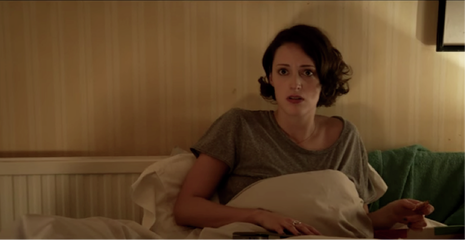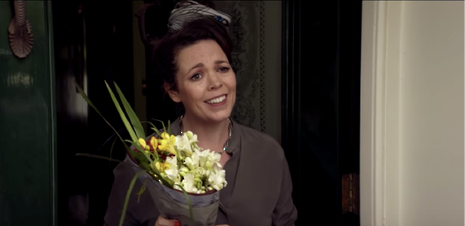TV: Fleabag
BBC Three’s comedy is a dark yet hilarious reflection of the life of a twenty-something, middle class, sex-obsessed woman, says Kitty Grady

With part three of the Bridget Jones film franchise premiering this week, it seems a suitable time to reflect on the journey of the middle class, single woman as a figure in comedy. Renée Zellweger first had us lolling in the early noughties with her guffawing performance of Helen Fielding’s loveable but luckless heroine, who proved a realistic antidote to Sex and the City’s serial-dating, perfectly manicured Carrie Bradshaw of the nineties. Despite her many mishaps and oft-lonely nights, however, Bridget Jones’s Diary, which is based on Austen’s Pride and Prejudice and directed with typical Richard Curtis tropes (Christmas finale, Hugh Grant), ultimately feels far more fairytale than gritty female testament.
In 2012 Lena Dunham’s Girls completely challenged the way young professional women were presented on screen. Her spread of female characters may have lived the same yuppie lifestyles of Sex and the City’s gal gang, but with none of the glamorous sheen. Dunham created huge buzz for depicting graphic, visceral sex scenes with full-frontal nudity and body types that challenged the impossibly thin female ideals in Hollywood. Furthermore, the main character Hannah, played by Dunham, is anxiety-prone, selfish and narcissistic to the point that she is often plain unlikeable as a character. A new spectrum of female identity was seismically introduced onto television.
Fleabag is a testament to the Girls effect and then some. Written by rising-talent Phoebe Waller-Bridge, she takes the most perverse and depressing themes of female experience to create an extremely dark television show that also makes us laugh ten times harder. The heroine, who is simply named Fleabag and played by Waller-Bridge herself, is the life force of the show. She (comically) runs a failing guinea pig-themed café which she set up with her (un-comically) deceased best friend Boo, who accidentally killed herself after walking into a busy road (she had only wanted to injure herself so that she could punish her cheating boyfriend by not letting him visit her in hospital).
Whereas it’s often pretty hard to sympathise with Dunham’s lead, it’s hard not to like Fleabag, partly because she is constantly swapping in and out of conversations to break the fourth wall with a wry smile or cheeky look and narrating with a witty running commentary. Unsurprisingly, Fleabag started life as a comedy show at the Edinburgh Fringe, and many of its theatrical qualities have been delightfully retained, with elements such as surreal dance choreography, monologues and characters with typed names like Bus Rodent and Arsehole Guy.

What Fleabag does have in common with Lena Dunham’s Girls, however, is its depiction of a polymorphous female sexuality: “I’m not obsessed with sex, I just can’t stop thinking about it,” she tells us while sitting on the loo, post-break up, wondering where her next shag is coming from. In the first episode, Fleabag breaks up with her boyfriend after he catches her masturbating to Barack Obama and she subsequently gets into a casual relationship with an extremely attractive man because she lets him give her anal. In a world of sensitive political correctness the show reflects the reality of so-called ‘Bad Feminism’: “I have a horrible feeling that I am a greedy perverted selfish apathetic cynical depraved morally bankrupt woman who can’t even call herself a feminist.”
The central relationship in the series isn’t a romantic one, but the one between Fleabag and her high-flying, uptight sister, Claire: “she’s probably anorexic – but clothes look great on her”. The comedy in the relationship is extremely well observed. They bicker like teenagers and a particularly funny scene shows Claire’s move to compassionately hug Fleabag resulting in her knee-jerk reaction to hit her in the face. Olivia Coleman is also brilliant as their sculptor stepmother – “she’s not an evil stepmother, she’s just a c**t” – while Hugh Dennis plays a greying office worker who Fleabag accidentally flashes to.
As much as Fleabag is laugh-out-loud funny, it is also about painful loneliness, sadness and disappointment. There are constant flashbacks to memories of Boo, and while Fleabag desperately reaches out to her emotionally unavailable father – “I just want to cry all the time” – she is too proud to ask her sister for help. Fleabag is not really young anymore, but nor a responsible adult, and there’s a sense that she really just needs someone to come to her rescue. No Mr Darcy for Fleabag, though; the real future is far bleaker.
All six episodes of Fleabag are now available on BBC iPlayer.
 News / Police to stop searching for stolen Fitzwilliam jade17 April 2024
News / Police to stop searching for stolen Fitzwilliam jade17 April 2024 News / Copycat don caught again19 April 2024
News / Copycat don caught again19 April 2024 Interviews / ‘It fills you with a sense of awe’: the year abroad experience17 April 2024
Interviews / ‘It fills you with a sense of awe’: the year abroad experience17 April 2024 News / Night Climbers call for Cambridge to cut ties with Israel in new stunt15 April 2024
News / Night Climbers call for Cambridge to cut ties with Israel in new stunt15 April 2024 News / Acting vice-chancellor paid £234,000 for nine month stint19 April 2024
News / Acting vice-chancellor paid £234,000 for nine month stint19 April 2024




